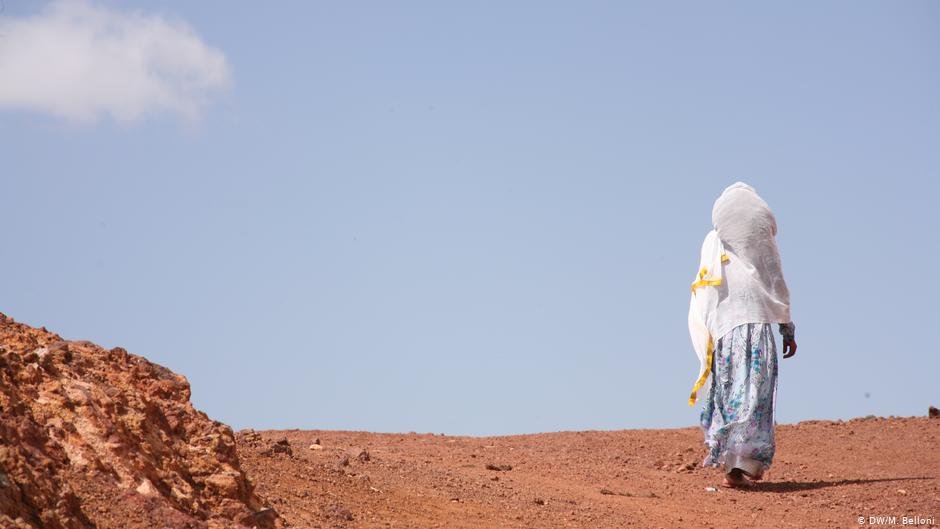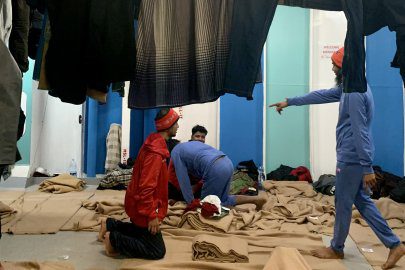InfoMigrants spoke with Eritrean migrants aboard Emergency’s Life Support search-and-rescue vessel in March 2024. Two of their stories highlight the grim reality of life for sub-Saharan migrants in Libya, where both lived for over three years before managing to cross the Mediterranean Sea to Italy.
Mehretab, a 27-year-old from Eritrea, spent the past six years trying to make it to Europe — the amount of time it might take a person of his age and education, born into a different reality, to complete a doctorate degree. After finishing his studies in electronics at an Eritrean technical school, at the age of 21, Mehretab left his country to avoid its mandatory military service. In Eritrea, all people — both male and female — are required to enter the service.
Although Eritrean law contains provisions limiting military conscription to 18 months, according to Human Rights Watch, it is often indefinite, and nearly impossible to avoid.
Mehretab traveled first to Ethiopia, where he worked for around six months in a video game shop earning around 50 dollars (around 46 euros) a month. This wasn’t enough to make a living, so he decided to travel on to Libya, where he planned to cross the sea to Europe. He called other Eritrean friends he knew who were already living there, and they connected him with a smuggler he calls a “broker”.
Migrants from Sub-Saharan Africa go to Libya in the hope of reaching Europe | Photo: Joe Penney/REUTERSArrival in Libya
After crossing through Sudan to Libya via foot and car, Mehretab eventually arrived in the Libyan coastal city of Sabratha, known as a hub for smuggling, located around an hour’s drive from Tripoli. He stayed there for nine months, then set off on his first journey across the Mediterranean. He had paid a smuggler 6,000 dollars for this trip, a fee that included the guidance that led him through the Sahara to Libya.
The first time Mehretab tried to cross the Mediterranean, in 2021, he was intercepted by the Libyan coast guard and sent to a prison. He said the prison guards beat up the migrants living there, only feeding them a small meal once per day.
He lived there for a week before managing to gather the money needed to pay his way out — around 700 dollars (around 651 euros).
“I’m so lucky,” he said, because he was able to get out quickly. “But my friends there, they stayed one month, two months. If you can’t pay money, you can’t get out.”
Read more: Rescued migrant cites ‘discrimination towards the poor’ as his reason to migrate
He obtained the cash by calling his parents and friends he had in disparate areas of Libya.
Mehretab made two more unsuccessful attempts to cross the sea. Both times, he found himself caught by the Libyan coast guard before even stepping foot into the boat meant to carry him to Europe. The first time, he was able to flee the so-called Libyan “officers” before they threw him into prison.
His luck ran out the next time he tried to cross: He was also caught before the boat set sail and was sent to a prison, where he lived for a month before scrounging the 1,000 dollars (around 930.20 euros) needed to pay his way out. It was winter during this prison stay, he said, explaining the jail was so cold “it was unbearable”. For those two failed attempts and his “bail”, Mehretab paid around 4,300 dollars (around 4,000 euros).
He was successful on his fourth attempt: After paying a smuggler 3,000 dollars (around 2,790 euros), Mehretab found himself on a boat rescued by the Italian NGO Emergency’s search-and-rescue vessel Life Support. But his friends remain in Libya, some of them in prison, he said.
“I have a lot of friends there [in Libya],” he said, explaining that this was the reason he wanted to tell InfoMigrants his story. “That’s why I am telling all of this. I have a lot of friends, my best friends, like brothers. They are all there and I left them.”
 Migrants with scabies were bundled into blue suits before disembarking from the Life Support in Ravenna | Photo: Clare Roth/InfoMigrants
Migrants with scabies were bundled into blue suits before disembarking from the Life Support in Ravenna | Photo: Clare Roth/InfoMigrants
A solo female migrant teenager with no money
Mehretab was rescued after 20 hours at sea on a fiberglass boat with a broken motor. Alongside him, among the 70 other migrants rescued, were around 10 other Eritreans. One of them, a 19-year-old girl named Elisabeth for whom we are using a fake name, also spent years trying to reach Europe.
Her story differs from Mehretab’s because she had no way of obtaining money from family or friends throughout her journey. Family members like Mehretab’s find ways to obtain the money to support their relatives in Libya by selling their possessions — their farms, for example, or homes. Elisabeth’s family had nothing to give.
A child of five, Elisabeth’s parents were both severely injured in Eritrea’s brutal border conflict with Ethiopia, which ended in 2018. Her mother was shot in the chest and her father in the leg, making it impossible for either of them to find work to support the family. At the age of 15, Elisabeth decided to leave Eritrea to travel to Sudan alone.
Read more: From Eritrean migrant to activist, the story of Abraham Tesfai
From the Eritrean border, where she lived with her family, she walked for three days to Sudan. There, she made contact with smugglers, who brought her to Khartoum and said they would take her to Libya to cross the sea.
From Khartoum, she traveled to Libya, where she lived in Tripoli for three years. She slept in a sort of holding house, owned by the smugglers, for indebted Eritrean migrants hoping to cross the sea to Europe who could not pay the fees required to board a boat.
She was stuck in the house all day with no chance of leaving, she said; the Libyans who had smuggled her into the country guarded it to ensure no one left, making it impossible for Elisabeth to earn money or see daylight.
At one point during her time in Libya, Elisabeth found herself in a prison, where she witnessed horrific abuse. She said she watched people getting shot and tortured by the Libyan guards, and mentioned that once, she witnessed a pregnant woman, in the process of giving birth, scream for help on the floor of the facility.
She needed medical attention, but no one came, and she died, Elisabeth said.
Eventually, after years in the smuggler’s house, Elisabeth was able to convince the traffickers to let her join a boat crossing the sea.
In Europe, Elisabeth told InfoMigrants, she wants to become a nurse, to help people.
“If you are not helping people, there is no point,” she said.
 Girls suffer in particular under Eritrea’s universal conscription program, with many reporting sexual abuse | Photo: DW/M. BelloniExpensive journey
Girls suffer in particular under Eritrea’s universal conscription program, with many reporting sexual abuse | Photo: DW/M. BelloniExpensive journey
A cultural mediator for Emergency, Yohannes, who regularly works with migrants who have crossed the sea, said Elisabeth’s story is not uncommon — sometimes, smugglers will allow a single woman in a group of dozens and dozens of men to cross without paying.
Yohannes, who also left Eritrea to cross the sea in 2008, said the smugglers in Libya understand how much they can get from people like Mehretab from places like Eritrea, where staying home means dying in conflict or starving to death.
He said sometimes, smugglers will charge these migrants the most money of everyone, because they know that for them, there is no alternative: the demand, in economic terms, is inelastic. A trip that would cost 6,000 euros for Egyptians might cost 20,000 for the Eritreans.
Read more: Remembering Segen, from Eritrea: A poet who died crossing the Mediterranean
Sometimes called the “North Korea of Africa”, Eritrea only opened its border with Ethiopia in 2018. Before that year, leaving the country was a seriously risky ordeal. There are many smuggling networks set up between Eritrea, Sudan and Libya, as well as Eritrea, Ethiopia, Sudan and Libya (the Eritrea-Sudan border has grown harder to cross in recent years). The goal of these migrants is Europe via the Mediterranean Sea.
Eritreans generally receive asylum once they reach the bloc. In 2023, around 83 percent of Eritreans’ requests for asylum were granted, according to the European Union Agency for Asylum.
Source link : https://www.infomigrants.net/en/post/56183/prison-punishment-and-pushbacks-from-eritrea-to-libya-to-italy
Author :
Publish date : 2024-04-02 07:00:00
Copyright for syndicated content belongs to the linked Source.





